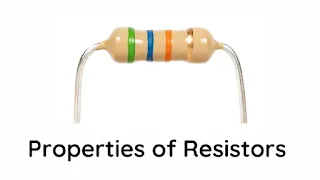Properties Of Resistors
Resistors are electrical components used to limit the flow of electrical current in a circuit. They are passive components, which means that they do not require any external power source to function. The following are some of the key properties of resistors:
- Resistance: The resistance of a resistor is the measure of its ability to resist the flow of electrical current. Resistance is measured in ohms (Ω).
- Tolerance: The tolerance of a resistor is the amount by which its actual resistance may vary from its specified or nominal value. Tolerance is expressed as a percentage of the nominal value.
- Power rating: The power rating of a resistor is the maximum amount of power it can dissipate without being damaged. Power rating is measured in watts (W).
- Temperature coefficient of resistance: The temperature coefficient of resistance (TCR) is the rate at which the resistance of a resistor changes with temperature. TCR is expressed in parts per million per degree Celsius (ppm/°C).
- Noise: Resistors can introduce noise into a circuit, which is a random fluctuation in voltage or current. The amount of noise generated by a resistor depends on its construction and the frequency range of the circuit.
- Frequency response: Resistors can also affect the frequency response of a circuit, which is the range of frequencies over which the circuit operates effectively. This is due to the parasitic capacitance and inductance that exists in every resistor.
- Temperature range: Resistors have a specific temperature range in which they can operate without being damaged. This temperature range is determined by the materials and construction of the resistor.
- Size and shape: Resistors come in various sizes and shapes, depending on their intended application. The physical size and shape of a resistor can affect its electrical properties, such as resistance and power rating.
Use Of Resistors
Resistors have a wide range of uses in electrical and electronic circuits. Some of the common uses of resistors include:
- Voltage division: Resistors are often used in voltage divider circuits, which divide a voltage into smaller values. This is useful in many applications, such as sensor circuits and audio circuits.
- Current limiting: Resistors can be used to limit the current flowing through a circuit. For example, they can be used to protect LEDs from burning out due to excessive current.
- Biasing: Resistors are used in biasing circuits, which set the operating point of transistors and other active devices. This is important for ensuring proper operation and stability of the circuit.
- Timing: Resistors are used in timing circuits, which control the duration of pulses or other signals. This is useful in applications such as oscillators and pulse generators.
- Temperature sensing: Resistors can be used as temperature sensors, as their resistance changes with temperature. This is useful in many applications, such as thermostats and temperature control circuits.
- Filtering: Resistors are used in filter circuits, which remove unwanted frequencies from signals. This is important in many applications, such as audio circuits and power supplies.
- Matching: Resistors can be used to match the impedance of different parts of a circuit, such as in audio circuits and transmission lines.
- Calibration: Resistors can be used as calibration standards, as they have a well-defined resistance that can be measured accurately. This is important in many applications, such as in test and measurement equipment.
Overall, resistors are one of the most basic and essential components in electrical and electronic circuits, with many important uses and applications.


